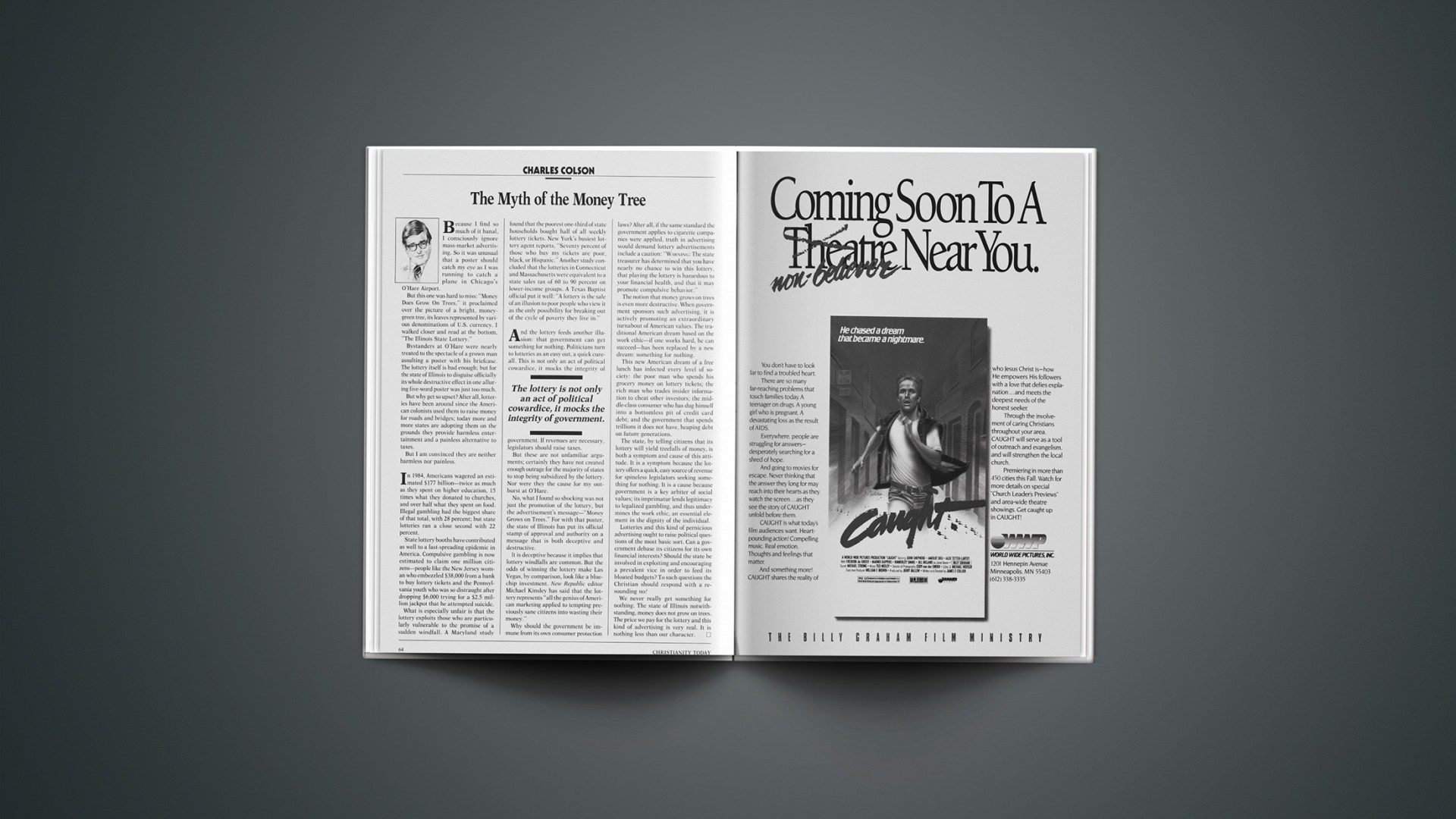Because I find so much of it banal, I consciously ignore mass-market advertising. So it was unusual that a poster should catch my eye as I was running to catch a plane in Chicago’s O’Hare Airport.
But this one was hard to miss: “Money Does Grow On Trees,” it proclaimed over the picture of a bright, money-green tree, its leaves represented by various denominations of U.S. currency. I walked closer and read at the bottom, “The Illinois State Lottery.”
Bystanders at O’Hare were nearly treated to the spectacle of a grown man assulting a poster with his briefcase. The lottery itself is bad enough; but for the state of Illinois to disguise officially its whole destructive effect in one alluring five-word poster was just too much.
But why get so upset? After all, lotteries have been around since the American colonists used them to raise money for roads and bridges; today more and more states are adopting them on the grounds they provide harmless entertainment and a painless alternative to taxes.
But I am convinced they are neither harmless nor painless.
In 1984, Americans wagered an estimated $177 billion—twice as much as they spent on higher education, 15 times what they donated to churches, and over half what they spent on food. Illegal gambling had the biggest share of that total, with 28 percent; but state lotteries ran a close second with 22 percent.
State lottery booths have contributed as well to a fast-spreading epidemic in America. Compulsive gambling is now estimated to claim one million citizens—people like the New Jersey woman who embezzled $38,000 from a bank to buy lottery tickets and the Pennsylvania youth who was so distraught after dropping $6,000 trying for a $2.5 million jackpot that he attempted suicide.
What is especially unfair is that the lottery exploits those who are particularly vulnerable to the promise of a sudden windfall. A Maryland study found that the poorest one-third of state households bought half of all weekly lottery tickets. New York’s busiest lottery agent reports, “Seventy percent of those who buy my tickets are poor, black, or Hispanic.” Another study concluded that the lotteries in Connecticut and Massachusetts were equivalent to a state sales tax of 60 to 90 percent on lower-income groups. A Texas Baptist official put it well: “A lottery is the sale of an illusion to poor people who view it as the only possibility for breaking out of the cycle of poverty they live in.”
And the lottery feeds another illusion: that government can get something for nothing. Politicians turn to lotteries as an easy out, a quick cure-all. This is not only an act of political cowardice, it mocks the integrity of government. If revenues are necessary, legislators should raise taxes.
But these are not unfamiliar arguments; certainly they have not created enough outrage for the majority of states to stop being subsidized by the lottery. Nor were they the cause for my outburst at O’Hare.
No, what I found so shocking was not just the promotion of the lottery, but the advertisement’s message—“Money Grows on Trees.” For with that poster, the state of Illinois has put its official stamp of approval and authority on a message that is both deceptive and destructive.
It is deceptive because it implies that lottery windfalls are common. But the odds of winning the lottery make Las Vegas, by comparison, look like a blue-chip investment. New Republic editor Michael Kinsley has said that the lottery represents “all the genius of American marketing applied to tempting previously sane citizens into wasting their money”
Why should the government be immune from its own consumer protection laws? After all, if the same standard the government applies to cigarette companies were applied, truth in advertising would demand lottery advertisements include a caution: “WARNING: The state treasurer has determined that you have nearly no chance to win this lottery, that playing the lottery is hazardous to your financial health, and that it may promote compulsive behavior.”
The notion that money grows on trees is even more destructive. When government sponsors such advertising, it is actively promoting an extraordinary turnabout of American values. The traditional American dream based on the work ethic—if one works hard, he can succeed—has been replaced by a new dream: something for nothing.
This new American dream of a free lunch has infected every level of society: the poor man who spends his grocery money on lottery tickets; the rich man who trades insider information to cheat other investors; the middle-class consumer who has dug himself into a bottomless pit of credit card debt; and the government that spends trillions it does not have, heaping debt on future generations.
The state, by telling citizens that its lottery will yield treefulls of money, is both a symptom and cause of this attitude. It is a symptom because the lottery offers a quick, easy source of revenue for spineless legislators seeking something for nothing. It is a cause because government is a key arbiter of social values; its imprimatur lends legitimacy to legalized gambling, and thus undermines the work ethic, an essential element in the dignity of the individual.
Lotteries and this kind of pernicious advertising ought to raise political questions of the most basic sort. Can a government debase its citizens for its own financial interests? Should the state be involved in exploiting and encouraging a prevalent vice in order to feed its bloated budgets? To such questions the Christian should respond with a resounding no!
We never really get something for nothing. The state of Illinois notwithstanding, money does not grow on trees. The price we pay for the lottery and this kind of advertising is very real. It is nothing less than our character.










